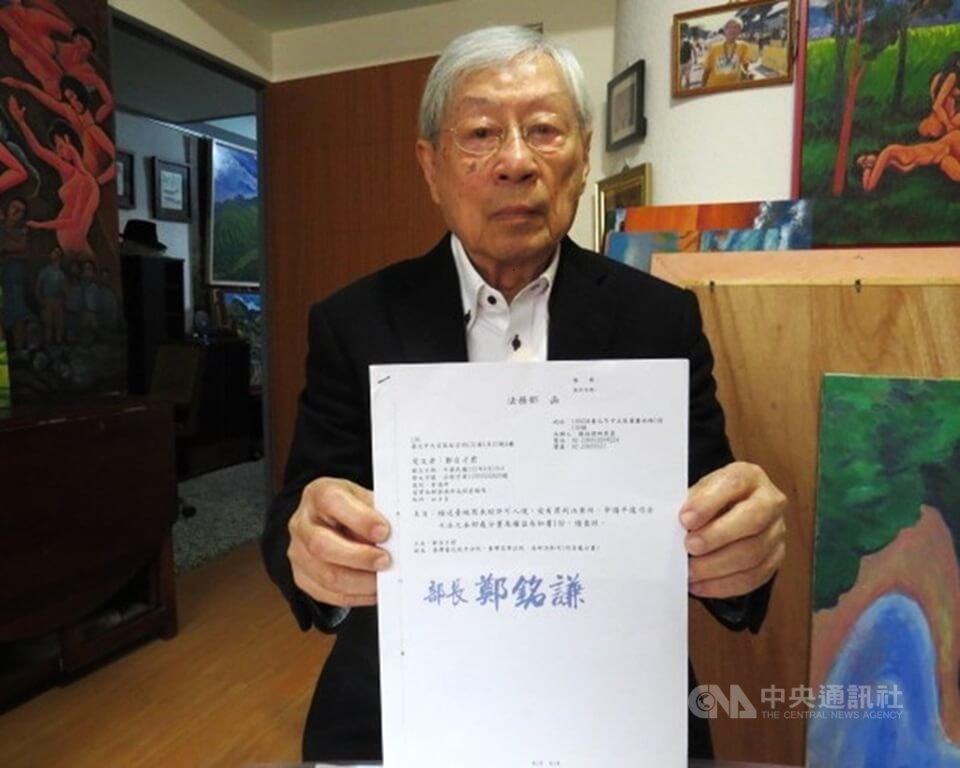In April 1970, Cheng Tzu-tsai (鄭自才) and his brother-in-law Huang Wen-hsiung (黃文雄) attempted to assassinate then-vice premier Chiang Ching-kuo (蔣經國) while he was visiting New York.
They were both apprehended after the attempt failed, and subsequently fled from the US after being released on bail. Cheng was later caught in Sweden and extradited back to the US, where he served a prison term.
However, the failed assassination attempt sparked a wave of Taiwanese independence movements overseas and forced Chiang to confront authoritarian governance issues when he later became president, lifting martial law in 1987.

Photo: CNA
Cheng returned to Taiwan in 1991 and was subsequently sentenced to one year in prison for illegally entering the country under the National Security Act (國家安全法).
Cheng’s case is one of thousands involving political crimes during Taiwan’s martial law period that have been redressed, according to the Ministry of Justice in an article published in a local media outlet today.
“Returning to one’s homeland is one’s right and freedom that no one should be deprived of. Coming back should not be a crime. I never thought I would be prosecuted,” Cheng said in an interview in a related article also published by the same outlet today.
Cheng, who had already served a prison sentence in the US, later applied to the ministry for redress.
As of December last year, 5,275 cases have been redressed including 2,114 administrative injustices and 3,161 judicial injustices, according to the Ministry of Justice.
Notable cases include Taiwanese democracy pioneer Peng Ming-min (彭明敏) and Cheng, exonerated in December and September last year respectively.
After the Transitional Justice Commission was dissolved in May 2022, the ministry assumed responsibility for redressing judicial and administrative injustices from the martial law period.
According to the Act on Promoting Transitional Justice (促進轉型正義條例), cases involving political victims are reviewed by a committee and confirmed by the ministry after deliberation.
Convictions or penalties deemed unlawful are considered nullified and the political victim’s relevant criminal record is cleared.
Cheng was classified as an overseas dissident at that time, restricting his entry and exit from the country, the ministry said.
Restricting his right to return to Taiwan was aimed at consolidating authoritarian rule and violated the principles of a free and democratic constitutional order, the ministry said.
The judgement concluded that he had unlawfully entered the country without providing evidence of his entry method, violating the Code of Criminal Procedure (刑事訴訟法) and subjecting Cheng to judicial injustice, it said.
The responsible agencies have been ordered to clear Cheng’s criminal record, it added.
Regarding transitional justice, Cheng said he hoped that every victim could be compensated and that every perpetrator should receive a penalty.
Cheng, who spent much of his time in prison painting, now runs an art studio focusing on Taiwan’s landscapes.
“I was born during Taiwan's martial law period when we couldn't go anywhere. I visited many places after returning to Taiwan and found it to be truly beautiful,” Cheng said.
While his conviction was the result of authoritarian rule, the redress of that injustice was made possible by democracy, he said.

Three batches of banana sauce imported from the Philippines were intercepted at the border after they were found to contain the banned industrial dye Orange G, the Food and Drug Administration (FDA) said yesterday. From today through Sept. 2 next year, all seasoning sauces from the Philippines are to be subject to the FDA’s strictest border inspection, meaning 100 percent testing for illegal dyes before entry is allowed, it said in a statement. Orange G is an industrial coloring agent that is not permitted for food use in Taiwan or internationally, said Cheng Wei-chih (鄭維智), head of the FDA’s Northern Center for

The Chinese military has built landing bridge ships designed to expand its amphibious options for a potential assault on Taiwan, but their combat effectiveness is limited due to their high vulnerability, a defense expert said in an analysis published on Monday. Shen Ming-shih (沈明室), a research fellow at the Institute for National Defense and Security Research, said that the deployment of such vessels as part of the Chinese People’s Liberation Army (PLA) Navy’s East Sea Fleet signals a strong focus on Taiwan. However, the ships are highly vulnerable to precision strikes, which means they could be destroyed before they achieve their intended

LOOKING NORTH: The base would enhance the military’s awareness of activities in the Bashi Channel, which China Coast Guard ships have been frequenting, an expert said The Philippine Navy on Thursday last week inaugurated a forward operating base in the country’s northern most province of Batanes, which at 185km from Taiwan would be strategically important in a military conflict in the Taiwan Strait. The Philippine Daily Inquirer quoted Northern Luzon Command Commander Lieutenant General Fernyl Buca as saying that the base in Mahatao would bolster the country’s northern defenses and response capabilities. The base is also a response to the “irregular presence this month of armed” of China Coast Guard vessels frequenting the Bashi Channel in the Luzon Strait just south of Taiwan, the paper reported, citing a

About 4.2 million tourist arrivals were recorded in the first half of this year, a 10 percent increase from the same period last year, the Tourism Administration said yesterday. The growth continues to be consistent, with the fourth quarter of this year expected to be the peak in Taiwan, the agency said, adding that it plans to promote Taiwan overseas via partnerships and major events. From January to June, 9.14 million international departures were recorded from Taiwan, an 11 percent increase from the same period last year, with 3.3 million headed for Japan, 1.52 million for China and 832,962 to South Korea,